“But Paradise Lost excited different and far deeper emotions. I read it, as I had read the other volumes which had fallen into my hands, as a true history. It moved every feeling of wonder and awe, that the picture of an omnipotent God warring with his creatures was capable of exciting. I often referred the several situations, as their similarity struck me, to my own. Like Adam, I was created apparently united by no link to any other being in existence.…Many times I considered Satan as the fitter emblem of my condition…”1
— The creature, in Mary Shelley’s Frankenstein; or, The Modern Prometheus (1818)
January 1st, 2018 marks the 200th anniversary of the publication of Mary Shelley’s Frankenstein. This nineteenth-century Romantic novel is known as a Janus work that looks both backward to eighteenth-century Gothic horror and forward to twentieth-century science fiction—to say nothing of its unshakeable status as a timeless reference for just about any morally questionable scientific endeavor—but less often discussed is its thematic dialogue with John Milton’s seventeenth-century epic poem Paradise Lost (1667). Exploring Frankenstein’s Miltonic elements, analyzing how they inform the novel, and reviewing how they obliquely contribute to the Romantic reading of Milton’s Satan as a profoundly sympathetic figure seems in order for the bicentenary of Mary Shelley’s masterwork.
Milton, Mary, and Shelley
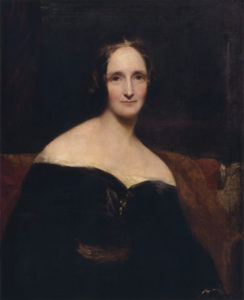
Mary Shelley was born Mary Wollstonecraft Godwin, the child of feminist pioneer Mary Wollstonecraft and anarchist philosopher William Godwin. Inheriting her parents’ creative genius meant inheriting the influence of Milton. Both Wollstonecraft and Godwin were members of the Johnson Circle—the London-based intellectual coterie presided over by the radical publisher Joseph Johnson—within which the Satan of Milton’s Paradise Lost was the subject of much spirited discussion, thus producing the first wave of Romantic Satanism, that most singular branch of Romanticism’s cult of Milton. For instance, Wollstonecraft noted in her feminist treatise A Vindication of the Rights of Woman (1792) that, in the face of the idealized domesticity of Milton’s Adam and Eve, “instead of envying the lovely pair, I have, with conscious dignity, or Satanic pride, turned to hell for sublimer objects,” and what Wollstonecraft describes as the most sublime sight—“the grandest of all human fights”—is “an outcast of fortune, rising superior to passion and discontent,”2 thus aligning fallen but still-dignified woman with Milton’s sublime Satan, who is Hell-doomed yet remains Heaven-defiant.3 Godwin was especially important in situating Milton’s Satan as a Romantic icon, defending in his influential Enquiry Concerning Political Justice (1793) a position that argues “Milton’s devil to be a being of considerable virtue” as one who, with a strong “sense of reason and justice,” had “rebel[led] against his maker…, as he himself informs us, because he saw no sufficient reason for that extreme inequality of rank and power which the creator assumed,” and who subsequently “bore his torments with fortitude, because he disdained to be subdued by despotic power.”4 Little did Godwin know that one of his own children would come to pen the modern world’s perennial tale about the tensions between creator and creature—a literary classic dedicated to none other than Godwin himself.5
The spirit of Milton loomed over Mary Shelley as much as he had over her prestigious radical parents. She had been reading Paradise Lost along with Percy Bysshe Shelley throughout the dreary summer of 1816,6 when the eighteen-year-old Mary first conceived what would become Frankenstein, courtesy of a ghost story competition proposed by Lord Byron, their neighbor on Lake Geneva, and a fellow English outcast.7 Unsurprisingly, like the pariah poetry of Shelley and Byron, Mary Shelley’s Frankenstein is suffused with Milton,8 advertising the Miltonic inheritance right on its title page, as Shelley’s novel takes its epigraph from Paradise Lost, when the fallen Adam addresses his Creator thus:
Did I request thee, Maker, from my Clay
To mould me Man, did I solicit thee
From darkness to promote me[?]… (X.743–45)9
These Miltonic lines must have been particularly poignant for Mary herself as a young person with a troubled relationship with her own makers: her birth had robbed her mother of life, as Wollstonecraft died from complications only eleven days after the birth of Mary in 1797, and, more importantly, her relationship with her father Godwin had been fractured when in 1814, at the age of sixteen, she eloped to the Continent with Shelley, Godwin’s ardent protégé, and a married man. A disowned daughter and a young woman demolishing her reputation in respectable society back home in England, Mary was in a state of profound alienation when the germ of Frankenstein took root in her youthful mind. The relationship between father and daughter would improve at the close of 1816 when Mary and Shelley married, following the suicide of Shelley’s first wife, Harriet Westbrook, who was pregnant with a third child by him. The marriage was in part intended to help Shelley’s case for custody of his two living children by Harriet, but he was nevertheless denied on account of his irreligion and dissoluteness.10 Following the fierce impulses of their hearts and indulging in idealistic pursuits to change the world mired the Shelleys in deep moral ambiguity, which had a turbulent impact on their lives. The intense ambivalence that accompanies aspiring beyond social mores permeates Frankenstein, and is often expressed through the lens of the Miltonic Satan.
How Milton’s Paradise Lost Informs Mary Shelley’s Frankenstein
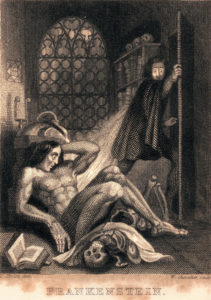
In the novel Frankenstein, both Victor Frankenstein and his unnamed creature11 are paralleled to Milton’s Satan. The creature in particular repeatedly relates his situation to Satan’s so as to stress his own alienation and despair, which in turns leads him to vengefully impose suffering on others—in this case, the kith and kin of Frankenstein, the source of the creature’s suffering. “I had cast off all feeling,” he relates, “subdued all anguish to riot in the excess of my despair. Evil thenceforth became my good” (159). Frankenstein’s creature takes the words right from the mouth of Milton’s Satan, who in his apostrophe to the Sun, finding “All hope excluded” and therefore “all Good” to be “lost” in him, infamously declares, “Evil be thou my Good…” (IV.105, 109–10). And as embracing evil at least puts Milton’s Satan in competition with God—“by thee at least / Divided Empire with Heav’n’s King I hold / By thee, and more than half perhaps will reign” (IV.110–12)—Frankenstein’s creature assumes some measure of dignity by his ability to pursue and punish his cruel creator. “As the story progresses so he becomes progressively more Satanic,” the late Christopher Small observed in Ariel like a Harpy: Shelley, Mary, and Frankenstein, “his powers growing to positively fiendish capacity (he is alluded to more often as ‘the Fiend’ in the later part of the book) and his ill deeds multiplying accordingly, but also taking on some of the Luciferian majesty so striking in Milton’s Satan.”12
Yet the Satan of Paradise Lost was no mere icon of evil for the Romantics, nor was he simply a symbol of the sublime; Milton’s Satan was also a profoundly sympathetic figure, and for this reason Frankenstein’s creature primarily draws the Satanic parallels to illicit sympathy, if not from Frankenstein than certainly from the reader. During his dramatic encounter with his own mortal maker, the creature reveals to “the modern Prometheus” Frankenstein that his autodidactic solitude included reading—in addition to Goethe’s The Sorrows of Young Werther (1774), Plutarch’s Lives, and Frankenstein’s journal relating the profane and grotesque four-month creation project—none other than Milton’s Paradise Lost, which presented a “picture of an omnipotent God warring with his creatures…” (90). On the one hand, Frankenstein’s creature relates to Milton’s Adam as another full-grown man derived directly from his creator, but on the other hand, Adam held pride of place in the Creation and was given a beautiful companion, whereas Frankenstein’s creature, as he himself observes, is an abomination—a monster, and a lonely one at that—and so he identifies with Milton’s Satan rather more. “Many times I considered Satan as the fitter emblem of my condition” (90), the creature confesses, and the main reason for this Satanic self-identification is that his sorrow and suffering, which propels him down a dark path of diabolical vengeance, is rooted in the cold rejection of his creator: “Remember, that I am thy creature: I ought to be thy Adam; but I am rather the fallen angel, whom thou drivest from joy for no misdeed. Every where I see bliss, from which I alone am irrevocably excluded. I was benevolent and good; misery made me a fiend” (68).
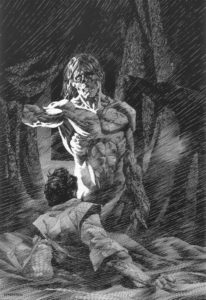
Of course, Frankenstein’s creature, doomed from “birth,” is far more alienated than Milton’s Satan, formerly an angelic aristocrat in the heavenly hierarchy, “he of the first, / If not the first Arch-Angel, great in Power, / In favor and preëminence…” (V.659–61). The creature himself, in a moment of supreme sadness, points out that Milton’s Satan, despite his damnation, was far more fortunate than he: “Satan had his companions, fellow-devils, to admire and encourage him; but I am solitary and detested” (91). Frankenstein’s more Satanic figure, then—when defined as a person of privilege who commits a grave transgression and suffers a severe fall for it—is Victor Frankenstein himself. As Small observed in his dissection of Frankenstein, “not only the Monster is a fallen angel: so is Frankenstein. He is so by definition, if we allow Prometheus to be identified in some respects with Lucifer. His attributes and aspirations are angelic: he is extraordinarily gifted, the particular darling of his family, even in ruin described (by Walton, after his death) as a ‘glorious spirit’.”13 Indeed, right at the start of Frankenstein, the character of Walton—the ambitious explorer whose perilous Arctic journey frames the narrative—describes the much-fatigued and near-frozen Victor Frankenstein he takes onboard in language quite reminiscent of Paradise Lost’s portrait of the fallen Satan, whose “form had yet not lost / All her Original brightness, nor appear’d / Less than Arch-Angel ruin’d…” (I.591–93). “He must have been a noble creature in his better days,” Walton writes to his sister, “being even now in wreck so attractive and amiable” (16). Near the end of the novel, Walton’s words are even more evocative of Milton’s great fallen archangel: “What a glorious creature must he have been in the days of his prosperity, when he is thus noble and godlike in ruin. He seems to feel his own worth, and the greatness of his fall” (152). This of course smacks of Paradise Lost’s Prince of Darkness, who in Hell is “Majestic though in ruin” (II.305)14 and is with “transcendent glory rais’d / Above his fellows, with Monarchal pride / Conscious of highest worth” (II.427–29), but who in sight of Eden also recognizes,
While they adore me on the Throne of Hell,
With Diadem and Sceptre high advanc’d
The lower still I fall, only Supreme
In misery; such joy Ambition finds. (IV.89–92)
This particular soliloquy of Satan’s in Paradise Lost is certainly called to mind by Frankenstein’s crestfallen confession to Walton at the close of Mary Shelley’s novel; emphasizing the overriding hubris of his ambitions and the resulting catastrophic fall, Frankenstein fully comprehends his likeness to Lucifer, “the archangel who aspired to omnipotence”:
When younger…I felt as if I were destined for some great enterprise.…I could not rank myself with the herd of common projectors. But this feeling, which supported me in the commencement of my career, now serves only to plunge me lower in the dust. All my speculations and hopes are as nothing; and, like the archangel who aspired to omnipotence, I am chained in an eternal hell.…From my infancy I was imbued with high hopes and a lofty ambition; but how am I sunk! Oh! my friend, if you had known me as I once was, you would not recognize me in this state of degradation. Despondency rarely visited my heart; a high destiny seemed to bear me on, until I fell, never, never again to rise. (152)
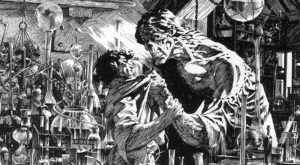
The Satanic turns out to be the strongest link between Frankenstein and his creature: Victor Frankenstein is a Satan before God insofar as he uses his God-given abilities to arrogate godlike power—in this case, the power to create life—and the creature is a Satan before his “God”—i.e., Frankenstein, his “father”—as a creature warring with his own creator. “You are my creator, but I am your master;—obey!” (120) barks Frankenstein’s creature to his “tyrant and tormentor” (121)—when Frankenstein reneges on his agreement to create a female companion for his lonely creature—the monster mimicking Milton’s Satan inasmuch as the archangelic arch-rebel obsesses over “maistring Heav’n’s Supreme” (IX.125).
It’s not for nothing that tradition has blurred the line between Frankenstein and his creature by bestowing the name of the former upon the latter, as the fates of both creator and creature are inextricably intertwined in Frankenstein. Hence, creator and creature echo one another: “…I bore a hell within me, which nothing could extinguish” (59), Victor Frankenstein states, later lamenting, “I was cursed by some devil, and carried about with me my eternal hell” (146), and his creature likewise cries, “I, like the arch fiend, bore a hell within me…” (95). Yet they both echo, as Frankenstein’s rather well-read creature acknowledges, Milton’s Satan, who suffers from “The Hell within him, for within him Hell / He brings, and round about him” (IV.20–21), and who knows that his eternal internal Hell is far worse than the “Infernal Pit” (I.657) wherefrom he has escaped: “Me miserable! which way shall I fly / Infinite wrath, and infinite despair? / Which way I fly is Hell; myself am Hell…” (IV.73–75). As we will see in the following section, however, Frankenstein’s frequent allusions to Milton’s Satan are there for more than simple dramatic effect.
How Mary Shelley’s Frankenstein Informs the Romantic Reading of Milton’s Paradise Lost
Mary Shelley’s novel Frankenstein is engaged in a dialogue with Paradise Lost’s themes, such as “the ways of God to men,” which Milton himself was attempting to “justify” (I.26). Romantic radicals of course celebrated Milton’s Satan as a noble rebel whose heroic defiance of what he lambasts as “the Tyranny of Heav’n” (I.124) roused admiration—and sometimes even emulation in the real-world sociopolitical struggles of the Romantics in their own age. Percy Shelley, for instance, wrote effusively in his Defence of Poetry (1821) that
Nothing can exceed the energy and magnificence of the character of Satan as expressed in Paradise Lost. It is a mistake to suppose that he could ever have been intended for the popular personification of evil.…Milton’s Devil as a moral being is as far superior to his God as one who perseveres in some purpose which he has conceived to be excellent in spite of adversity and torture, is to one who in the cold security of undoubted triumph inflicts the most horrible revenge upon his enemy, not from any mistaken notion of inducing him to repent of a perseverance in enmity, but with the alleged design of exasperating him to deserve new torments.15
Small posited in Ariel like a Harpy that whereas Percy Shelley’s reading of Milton presents “a simple reversal…of moral virtue between God and the Devil,” Mary Shelley’s does not: “For Shelley it was simple: Satan, the justified rebel, was virtuous, God the tyrant was evil. But the moral ambiguity was restored by Mary.”16 This is not entirely accurate of either of the Shelleys, however. While it is certainly true that Frankenstein presents the most ambivalent Romantic commentary on the Miltonic inheritance, Mary Shelley heaps far more sympathy upon Milton’s Satan than may be immediately apparent, and thus she is closer than Small and others have suspected to Percy Shelley’s position on the infernal figure, which does not outright idealize the Devil but presents a rather nuanced assessment.
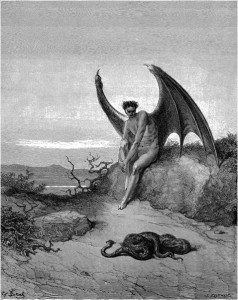
Shelley voiced his ambivalent view of Milton’s Satan quite clearly in the Preface to his Prometheus Unbound (1820). “The only imaginary being resembling in any degree Prometheus, is Satan,” Shelley contends, yet he proceeds to explain that Prometheus is “a more poetical character than Satan” because the deity-defiant, humanitarian Titan shares the virtues of “courage and majesty and firm and patient opposition to omnipotent force” without the vices of “ambition, envy, revenge, and a desire for personal aggrandisement, which in the Hero of Paradise Lost, interfere with the interest.”17 As far as Shelley was concerned, while “Prometheus is, as it were, the type of the highest perfection of moral and intellectual nature, impelled by the purest and the truest motives to the best and noblest ends,” the same simply cannot be said for the character of Milton’s Satan, who instead “engenders in the mind a pernicious casuistry which leads us to weigh his faults with his wrongs and to excuse the former because the latter exceed all measure.”18 This rather bold position of Shelley’s—that Satan’s shortcomings are essentially excusable because they are utterly outweighed by the wrongdoing perpetrated against him—was previously asserted far less vaguely in one of Shelley’s earlier, unpublished works: his Essay on the Devil and Devils (ca. 1819–20). As a matter of fact, the above quotation from A Defence of Poetry—that Milton’s Satan is unsurpassable in “energy and magnificence”—was a passage Shelley took nearly verbatim from his Essay on the Devil, but what Shelley prudently chose not to copy from his Essay over to his Defence was his irreverently detailed description of how and why that which is genuinely malignant in Milton’s otherwise virtuous Devil—his quest for the destruction of Man—may be blamed upon Milton’s God, who, as in Satan’s “baleful eyes” (I.56), emerges as the far more demonic figure of the story.
In his Essay on the Devil, Shelley observes how remarkably undaunted Milton’s Satan remains in the face of his damnation; however, once God had “exhausted all the varieties of smothering and burning and freezing and cruelly lacerating his external frame, and the Devil laughed at the impotent revenge of his conqueror,” Shelley finds that the almighty tyrant resorted to corrupting Satan’s “benevolent and amiable disposition”19 instead. Milton’s God, according to Shelley, diabolically coerces Satan to pursue the parents of the human race—for whom Satan expresses genuine sympathy—and thereby magnify his own damnation:
He is forever tortured with compassion and affection for those whom he betrays and ruins; he is racked by a vain abhorrence for the desolation of which he is the instrument; he is like a man compelled by a tyrant to set fire to his own possession, and to appear as the witness against and the accuser of his dearest friends and most intimate connections, and then to be their executioner and to inflict the most subtle protracted torments upon them. As a man, were he deprived of all other refuge, he might hold his breath and die—but God is represented as omnipotent and the Devil as eternal. Milton has expressed this view of the subject with the sublimest pathos.20
This is undoubtedly Romanticism’s most extreme defense of the Satan of Paradise Lost. As early as the seventeenth century, Milton’s Satan had been deemed the epic poem’s “hero”—i.e., its active character who is triumphant in his quest21—and throughout the eighteenth century Satan was widely considered an exemplar of the sublime,22 so much so that the text on the sublime, Edmund Burke’s A Philosophical Enquiry into the Origin of our Ideas of the Sublime and Beautiful (1757), held up Hell’s towering and still-heavenly radiant Satan as a supreme example of sublimity.23 Many prominent Romantics went further and applauded Milton’s Satan as heroic, if not an outright hero, for his rebellion in Heaven (rather than in spite of it) and his defiance in Hell, but even they tended to overlook Satan’s nefarious activities in Eden. Shelley, on the other hand, brings this aspect of Satan into focus in his Essay on the Devil, which is especially daring for its purpose: incriminating the Deity rather than the Devil.
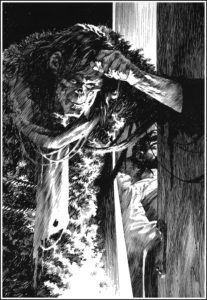
It does not seem at all unlikely that a major inspiration for Shelley’s apology for Milton’s Satan was none other than Frankenstein’s monster, whose plight Shelley views through a similar lens. “Treat a person ill, and he will become wicked,” observed Shelley in 1817 in his commentary on his wife’s soon-to-be-published novel, arguing on behalf of its unfortunate creature that “the circumstances of his existence are so monstrous and uncommon, that, when the consequences of them became developed in action, his original goodness was gradually turned into inextinguishable misanthropy and revenge.”24 This is strikingly similar to Shelley’s assertion in his Essay on the Devil (written two or three years later) that Satan’s “benevolent and amiable disposition” is spoiled by his most monstrous circumstances. Of course, unlike Mary Shelley’s victimized creature, Milton’s Satan is not driven from the “happy Fields” (I.249) of Heaven “for no misdeed” (68). Then again, in the rebellious Romantic reading of Paradise Lost, Satan is much more than merely innocent; his rebellion against the Almighty is admirable, and his heroic endurance of all that omnipotent power can hurl down on his defiance is as praiseworthy as the longsuffering Prometheus. As Shelley himself put it, Milton’s Satan is “one who perseveres in some purpose which he has conceived to be excellent in spite of adversity and torture,” one who possesses the “energy and magnificence” of “a moral being…far superior to his God,”25 and so the immoral depths of envy and revenge into which the fallen angel is “thrust[ed]” (IV.508) by the omnipotent hand of Milton’s implacably angry God serves only to excite greater rage for the demonic Deity against whom Satan so nobly rebelled and under whom he suffers in such a Promethean manner.
While Shelley’s profoundly blasphemous apology for the Satan of Paradise Lost quoted at length above appears on the surface of it to overstate the Devil’s case, there is ironically substantial textual support for Shelley’s most sympathetic stance on the fallen angel. Milton’s Satan, as Shelley observes, is anything but “the popular personification of evil,”26 for even when we find him plotting Adam and Eve’s ruin, the Devil remains rather sympathetic. Milton’s soliloquizing Satan, with the hapless human couple in his sight, says that he is “no purpos’d foe / To you whom I could pity thus forlorn / Though I unpitied” (IV.373–75), and he not only “could pity” but “could love” (IV.363) them. Sorrowful, Satan ultimately places the blame upon God Himself for the loathsome vengeance he is forced to inflict upon the innocent parents of the human race: “Thank him who puts me loath to this revenge / On you who wrong me not for him who wrong’d” (IV.386–87). Certain Milton critics have argued that this psychological depth Milton curiously infused his Devil with—not least through the five soliloquies he is given throughout Paradise Lost (IV.32–113, 358–92, 505–35; IX.99–178, 473–93)—is there to demonstrate how God’s creatures (corporeal or incorporeal) pave the road to Hell, which is to say, how horrible evils are committed by shirking moral responsibility and thereby finding a way to justify immoral acts, as when Satan enumerates what “compels me now / To do what else though damn’d I should abhor,” which Milton responds to with the disarming lines, “So spake the Fiend, and with necessity, / The Tyrant’s plea, excus’d his devilish deeds” (IV.391–94). Others have not found this line of reasoning a satisfactory explanation for why Milton—who again with Paradise Lost took it upon himself to “justify the ways of God to men” (I.26)—chose to play up Satan’s majestic grandeur and heroic daring while downplaying his malevolence, creating a Satan not evil incarnate but a complex character reluctantly driven to iniquity by his irremediable circumstances.
To fully comprehend how diluted the evil intent of Milton’s Devil is, we need only compare him to similar literary incarnations of the Prince of Darkness. It has been observed that Milton’s epic hero Satan of Paradise Lost is a descendant of the Lucifers of Renaissance epic;27 however, Milton’s Satan differs markedly from his Renaissance forebears, not least for ruining Adam and Eve being an afterthought for him (I.650–56, II.344–76), an indirect means of bittersweet revenge against the omnipotent Deity that defeated the angelic insurgents in open war (IX.171–78). Envy of Man is much more at the forefront of the other Renaissance Lucifers’ minds.28 In Paradise Lost, Satan initially rises in rebellion against “he who reigns / Monarch in Heav’n” (I.637–38) over the Almighty’s exaltation of His Son to universal kingship (V.600ff.)—to the Romantics a suspect choice for the antimonarchical Milton, apologist for the regicide of Charles I, propagandist for Oliver Cromwell’s Commonwealth, and persona non grata under the restored monarchy with Charles II on the throne. The prior Renaissance epics, by contrast, preferred envy of Man as the root cause of the angels’ rebellion in Heaven and subsequent everlasting war with God.29 Joost van den Vondel’s Lucifer (1654) may offer the closest literary cousin of Milton’s Satan, yet even here enmity with Man is so acute in its eponymous tragic character that in Lucifer’s sequel, Adam in Exile (1664), Vondel depicts a depraved Devil who fantasizes about dancing triumphantly around the corpses of Adam and Eve in their paradisiacal garden turned grave.30 This is a far cry indeed from Milton’s Satan, who sheds tears for Adam and Eve when ruminating on how their “harmless innocence” must soon be destroyed by him, who has no recourse but to precipitate their ruin (IV.388–92).
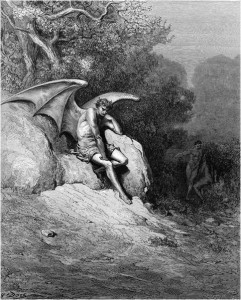
Although Milton follows tradition by having the angelically arrogant Satan express disdain for the earthborn creatures of dust promoted to the bliss wherefrom he’s been banished (IV.505–11; IX.143–57), Milton also—and more significantly—breaks radically from tradition by giving his Satan uniquely mixed emotions about orchestrating the Fall of Man, and this peculiar choice lends substantial support to the claim made by Shelley (and by Satan) that Paradise Lost’s Devil has been provoked in his envious malignity by a devious Deity. The sole purpose for which Milton’s God crafts human life is to “worship him.… / And multiply a Race of Worshippers” (VII.628, 630), worshippers who are created to fill the vacant positions of the celestial congregants who rebelled and fell with Satan (VII.150–61). Man, God Himself specifically says, is made to spite Satan, “lest his heart exalt him in the harm / Already done, to have dispeopl’d Heav’n, / My damage fondly deem’d…” (VII.150–52). Satan is certainly not off the mark when he dubs “this new Favorite / Of Heav’n, this Man of Clay” a “Son of despite” (IX.175–76). His “envy” having been “Provoke[d],” Satan decides that “spite then with spite is best repaid” (IX.175, 178), and Milton’s God follows suit, as the Son expresses that the Father’s offer of salvation to fallen Man is, at least in part, designed to spite Satan (III.150–62). The Fall of Man ultimately deals no damage to Milton’s Deity, of course (even the War in Heaven is, in His words, “My damage fondly deem’d”), and in fact the Almighty will only profit from the Fall, for He boasts that Man will “to me owe / All his deliv’rance, and to none but me” (III.181–82). Satan, on the other hand, inflicts upon himself horrible damage by destroying Adam and Eve’s innocence: “…so bent he seems / On desperate revenge,” observes Milton’s omniscient God, “that shall redound / Upon his own rebellious head” (III.84–86), and Satan himself comes to comprehend that “of worse deeds worse sufferings must ensue” (IV.26)—that his relentless pursuit of vengeance only courts further suffering for himself; yet he finds no choice but to carry on:
Revenge, at first though sweet,
Bitter ere long back on itself recoils;
Let it, I reck not, so it light well aim’d,
Since higher I fall short, on him who next
Provokes my envy… (IX.171–75)
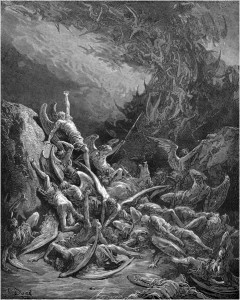
Paradise Lost anticipates—and appears to support, albeit unintentionally—Shelley’s radical assertion that Milton’s God is the true architect of the Devil’s malevolence towards Man. Satan snidely but quite rightly states to Gabriel, Eden’s archangelic guardian, “let him surer bar / His Iron Gates, if he intends our stay / In that dark durance” (IV.897–99), and indeed we are reminded early on in Milton’s epic that it is the Almighty Himself who frees Satan from the burning lake of Hell so that “with reiterated crimes he might / Heap on himself damnation” (I.214–15), as well as garner greater glory for God, as Satan’s “spite still serves / His glory to augment” (II.385–86). Milton’s God not only frees Satan from the “Adamantine Chains” (I.48) that bind him on Hell’s burning lake, but places the key to the gates of Hell in the hands of Satan’s daughter Sin, who is easily convinced by her father to aid him in undermining God’s Creation by unlocking the infernal gateway, allowing Satan to commence his journey to Eden (II.850–84). When Milton informs us that “Sin and Death amain / Following his track,” he is sure to emphasize that “such was the will of Heav’n” (II.1024–25), for in the Miltonic cosmos, “the Spirits perverse / With easy intercourse pass to and fro / To tempt or punish mortals…” (II.1030–32). What’s more, Milton explains that human history’s pagans had “Devils to adore for Deities” (I.373) because the host of Hell assumed the identities of the various pagan gods, “wand’ring o’er the Earth, / Through God’s high sufferance for the trial of man…” (I.365–66). This strange scheme of Milton’s God—using the fallen spirits to lead much of the human race astray as some sort of test—all begins with the Almighty using the infernal fugitive Satan to put Adam and Eve’s obedience to the test by having them face disobedience personified (III.80–96). The interlocking reason for Milton’s God ensuring Satan’s arrival in Eden, however, is to lead Satan deeper into his own damnation, as Shelley surmised.
Any genuinely ill-willed action taken up by Satan and his infernal peers occurs only after they have been hurled down into hellfire, and their “Prison ordained” is no correctional facility, but a “Dungeon horrible,” a fiery pit of utter damnation “where peace / And rest can never dwell, hope never comes / That comes to all; but torture without end…” (I.71, 61, 65–67). As Shelley observed, Milton’s God “in the cold security of undoubted triumph inflicts the most horrible revenge upon his enemy,” but not to break Satan’s spirit and drive him into repentance or reform, but strictly to sadistically perpetuate his torment.31 Shelley is quite simply not off the mark, and Milton’s “Torturer” (II.64) God appears to allow Satan to escape from his hopeless infernal torture chamber and journey to the blessed joys of Eden only because He knows that Satan will there be subjected to the greater torment of “the hateful siege / Of contraries” (IX.121–22), fulfilling a punishment of self-destruction devised for the otherwise unconquerable adversary. The twentieth-century literary critic A. J. A. Waldock would go even farther than Shelley, exonerating Milton’s Satan by arguing that his descent is not merely designed by Milton’s God but by Milton himself: “The changes do not generate themselves from within: they are imposed from without. Satan, in short, does not degenerate: he is degraded.”32 Then again, to protest that Milton’s sublime and sympathetic Satan is undone because he is ultimately treated unfairly by an overpowering hand pulling the strings is essentially Shelley’s argument; the Romantic poet simply stepped into Milton’s cosmos to make the case—a case which, while stunningly irreverent in making God the true “Author of evil,” as Satan is labeled for his “revolt” (VI.262), is surprisingly strong.
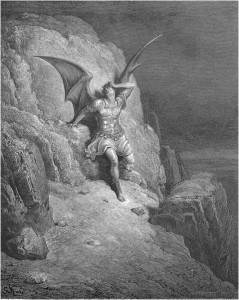
Milton critics less sympathetic to Satan than Shelley argue that the rebel angel’s heroism in Paradise Lost’s infernal books—specifically his “unconquerable Will” and “courage never to submit or yield” (I.106, 108), his “dauntless courage, and considerate Pride” (I.603), his assertion that “The mind is its own place, and in itself / Can make a Heav’n of Hell, a Hell of Heav’n” (I.254–55), and his declaration that it is “Better to reign in Hell, than serve in Heav’n” (I.263)—entirely evaporates when Satan is no longer in the infernal regions fighting to rekindle the spirits of his fallen compatriots. It is wrong, however, to view Milton’s Satan as putting on a duplicitous show for political purposes in Hell; it is only after Satan plants his “unblest feet” (I.238) on Earth at the opening of Book IV and directs his gaze toward the Sun, whose divine radiance serves as a bitter reminder of his loss, that this Devil demonstrates a shift in perspective:
O thou that with surpassing Glory crown’d,
Look’st from thy sole Dominion like the God
Of this new World; at whose sight all the Stars
Hide thir diminisht heads; to thee I call,
But with no friendly voice, and add thy name
O Sun, to tell thee how I hate thy beams
That bring to my remembrance from what state
I fell, how glorious once above thy Sphere;
Till Pride and worse Ambition threw me down
Warring in Heav’n against Heav’n’s matchless King:
Ah wherefore! he deserv’d no such return
From me, whom he created what I was
In that bright eminence, and with his good
Upbraided none; nor was his service hard. (IV.32–45)
Prior to this point, Satan has traveled alone across the landscape of Hell, the realm of Chaos, the material cosmos, and the surface of the Sun without suffering any such mental breakdown. Worth noting is that Milton himself, in Book IV’s opening “Argument,” writes that “Satan now in prospect of Eden…falls into many doubts with himself” (277), and not that he—as Satan’s detractors theorize—shows his true face or something to that effect. Satan goes on to reaffirm his position as God’s great adversary, as he later recalls to himself,
…I in one Night freed
From servitude inglorious well nigh half
Th’ Angelic Name, and thinner left the throng
Of his adorers… (IX.140–43)
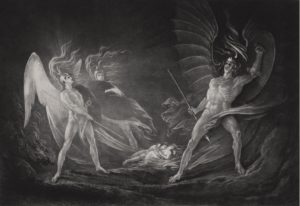
When the fallen angel returns triumphantly to Hell at the end of his journey, he in fact revels in his identity “Of Satan (for I glory in the name, / Antagonist of Heav’n’s Almighty King)…” (X.386–87). Nevertheless, throughout that journey Satan suffers continued hellish pangs over his loss of heavenly blessedness, a feeling reinforced by the very “Earth, how like to Heav’n, if not preferr’d / More justly, Seat worthier of Gods…” (IX.99–100). Indeed, Book IV not only opens but closes with such a moment, when Satan is discovered within the bower of the slumbering Adam and Eve by the celestially radiant angelic guards Ithuriel and Zephon:
…abasht the Devil stood,
And felt how awful goodness is, and saw
Virtue in her shape how lovely, saw, and pin’d
His loss; but chiefly to find here observ’d
His lustre visibly impair’d… (IV.846–50)
As Satan acknowledges in the first of his five soliloquies given throughout his sorrowful sojourn in Eden, “myself am Hell,” for Satan is painfully well aware that his suffering is to intensify with each step closer to carrying out the ruin of the human race: “…in the lowest deep a lower deep / Still threat’ning to devour me opens wide, / To which the Hell I suffer seems a Heav’n” (IV.75–78). We repeatedly witness Satan’s horrid pain induced by the pleasures surrounding him; exposed to the sight of bliss by the will of God, the Hell-flames within Satan are relentlessly stoked: “…the more I see / Pleasures about me, so much more I feel / Torment within me…” (IX.119–21). “O Hell!” is Satan’s reaction to the sight of Adam and Eve, even though his “thoughts pursue [them] / With wonder, and could love, so lively shines / In them Divine resemblance” (IV.358, 363–65), and not long after we hear him cry “Sight hateful, sight tormenting!” in response to the two “Imparadis’t in one another’s arms…” (IV.505–06). Milton’s Devil is never evil incarnate, however: when Satan (housed within the serpent) sets his sights on the lonesome Eve in her peerless beauty, for instance, he is suddenly struck “Stupidly good”:
That space the Evil one abstracted stood
From his own evil, and for the time remain’d
Stupidly good, of enmity disarm’d,
Of guile, of hate, of envy, of revenge… (IX.463–66)
Yet once again, the fallen angel’s innate admiration for the beauty of goodness is spoiled by the hellish misery his “punisher” (IV.103) has infused in his breast as an affliction fit for the cosmic pariah:
But the hot Hell that always in him burns,
Though in mid Heav’n, soon ended his delight,
And tortures him now more, the more he sees
Of pleasure not for him ordain’d… (IX.467–70)
As Satan earlier states, “only in destroying I find ease / To my relentless thoughts” (IX.129–30), and his “hot Hell that always in him burns” forces Satan to recall that he is Hell-bent on Man’s destruction:
Thoughts, whither have ye led me, with what sweet
Compulsion thus transported to forget
What hither brought us, hate, not love, nor hope
Of Paradise for Hell, hope here to taste
Of pleasure, but all pleasure to destroy,
Save what is in destroying, other joy
To me is lost. (IX.473–79)
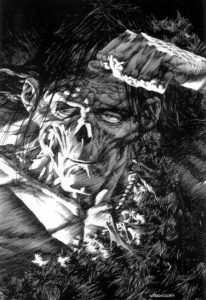
Which brings us back to Mary Shelley’s Frankenstein. “All, save I,” cries Frankenstein’s creature, “were at rest or in enjoyment: I, like the arch fiend, bore a hell within me; and, finding myself unsympathized with, wished to tear up the trees, spread havoc and destruction around me, and then to have sat down and enjoyed the ruin” (95). The creature expresses this nihilistic fury even though he bids the “happy earth” a “fit habitation for gods” (80)—lines themselves lifted from Milton’s Satan (IX.99–100)—and this hellish rage is not reserved merely for those who cruelly exclude the creature; it inevitably extends even to those who, like Adam and Eve, exemplify the best of humanity. Frankenstein’s creature confesses that he often “considered Satan as the fitter emblem of my condition” because, when he “viewed the bliss” of the De Lacy family—the thoroughly admirable cottagers whose hovel he had surreptitiously taken refuge in—“the bitter gall of envy rose within me” (90), just as Satan envies the prelapsarian human pair, despite their lovely divine resemblance. Haunted by his hellish thoughts and the diabolical deeds which have resulted from his sorrow and suffering, the creature acknowledges at the end of his tragic journey that, like Milton’s Satan, he has fallen so far:
I was nourished with high thoughts of honour and devotion. But now vice has degraded me beneath the meanest animal. No crime, no mischief, no malignity, no misery, can be found comparable to mine. When I call over the frightful catalogue of my deeds, I cannot believe that I am he whose thoughts were once filled with sublime and transcendent visions of the beauty and the majesty of goodness. But it is even so; the fallen angel becomes a malignant devil. Yet even that enemy of God and man had friends and associates in his desolation; I am quite alone. (160)
The descent of Frankenstein’s creature into evil is principally caused by his creator’s negligence, and as harsh as this mortal maker may be towards his monstrous creature, Frankenstein does on occasion express guilt for his negligence;33 Milton’s God, however, deliberately orchestrates Satan’s prolonged self-destruction, and even finds it occasion for laughter (V.711–42). Frankenstein is vilified for his disastrous attempt at playing God, yet he at least has the excuse of being but a mortal man, whereas God Himself—all-knowing, all-powerful, and (by His own judgment) all-good—has no such excuse. Victor Frankenstein ultimately seems far less villainous and criminal than the all-too-human “angry Victor” (I.169) of Paradise Lost on account of the sadistic game Milton’s God plays with Satan, manipulating the fallen angel to betray his finer feelings and bring destruction both to himself and to others. Frankenstein’s creature pleads, “misery made me a fiend” (68), and misery has likewise made Milton’s Satan a fiend—the “Arch-fiend” (I.156), as he is “Supreme / In misery…” (IV.91–92).
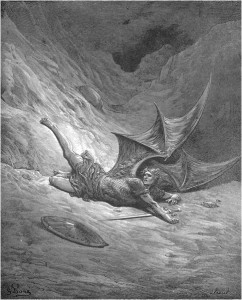
Both Milton’s Satan and Frankenstein’s creature, in Percy Shelley’s estimation, are victims of circumstance, and it should come as no surprise that when Frankenstein was first published anonymously in 1818, Shelley was widely assumed to have authored the novel penned by his wife’s hand. Lord Byron may have taken the Miltonic heritage a step further in Cain (1821) by transforming the Tempter of Eden into a Promethean liberator and enlightener—which itself, it can be argued, is anticipated in the response elicited from Milton’s Satan when he first learns of Adam and Eve being barred from the Tree of Knowledge (“Knowledge forbidd’n? / Suspicious, reasonless. Why should thir Lord / Envy them that?” [IV.515–17])—but Percy Shelley’s radical moral reevaluation of Milton’s Satan, “pernicious casuistry”34 though it may be, forgives the fallen angel his flaws, virtually redeeming the Devil. Yet that this redemptive reading of Shelley’s applied both to Frankenstein’s creature and to Paradise Lost’s Satan highlights how Mary Shelley’s novel—painfully tragic though it may be—is worthy of far greater consideration in discussions of Romanticism’s rehabilitation of Milton’s Satan.
Just as Mary Shelley survived by far the other members of the Lake Geneva ghost story group of 1816, her novel Frankenstein—conceived and begun by Shelley when she was still a teenager—mimicked its maker insofar as it has proven to be the longest-lasting and influential literary creation produced by the Romantic age. “I bid my hideous progeny go forth and prosper,” she wrote in the Introduction to Frankenstein’s 1831 edition,35 and prosper Frankenstein did, for two centuries later we are still reflecting on this Romantic novel and its implications—and its influence. Mary Shelley’s Frankenstein is not typically included in the canon of Romantic Satanism, and is instead often read simplistically as a wholly hostile reaction to Romanticism’s hubris and resulting perverseness. Frankenstein, like Paradise Lost, is far more ambiguous and ambivalent than that. As the literary critic Paul A. Cantor beautifully put it in Creature and Creator: Myth-making and English Romanticism:
Both Frankenstein and the monster are symbols of the Romantic revolt against the human condition, the idealistic refusal to accept the facts of human nature. In portraying the disastrous consequences of this revolt, Mary Shelley wrote one of the few truly tragic stories in Romantic literature, perhaps because she was dramatizing the tragedy of Romanticism itself.36
Romantic-inspired sympathizers of Milton’s Satan especially ought to take a closer look at Mary Shelley’s complex masterwork. Today, sympathy for Frankenstein’s monster is commonplace; however, just as the parallels the creature of Shelley’s novel draws to the damned angel of Paradise Lost serve to make him seem more sympathetic, the parallels can be drawn in reverse, and to the same effect. If Frankenstein’s monster is worthy of readers’ sympathies, so too is Milton’s reluctant monster, and so while Mary Shelley’s Frankenstein may be Romanticism’s most ambivalent venture into Miltonic mythmaking, her groundbreaking story indirectly offers up one of the most sympathetic readings of the Satan of Paradise Lost. William Blake’s The Marriage of Heaven and Hell (1790–93) may have provided Romanticism’s most famous assessment of Paradise Lost—that “Milton…was a true Poet and of the Devils party without knowing it”37—but Mary Shelley’s Frankenstein, though often overlooked in discussions of the Romantic reevaluation of Milton’s Satan, is really a companion to the Blakean reading of Paradise Lost, which essentially holds that Milton, like the legendary Dr. Frankenstein himself, lost control of his monster.
Notes